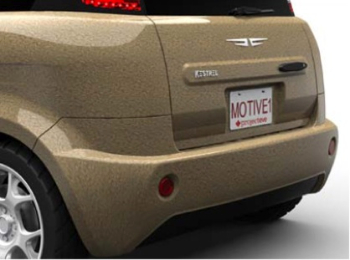
Don’t Bogart My Ride, Dude
By DE staff
GeneralCalgary's Motive Industries to debut hemp-bodied EV concept car

Photo curtesy of Motive Industries Inc.
Calgary-based Motive Industries, a transportation design firm specializing in advanced design and material manufacturing, will officially debut Canada’s first bio-composite bodied electric car next week during the September EV 2010 VÉ Conference and Trade Show in Vancouver. Called the Kestrel, the car is an electric 4-passenger, 3-door vehicle that’s body is made from impact resistant bio composite material. The composite is made from hemp mats produced by Alberta Innovates Technology Futures (AITF) from hemp stock grown in Vegreville, Alberta.
Prototyping and testing of the Kestrel began in August with a the goal of achieving the same mechanical properties as glass composites while also reducing weight. According to Dr. John Wolodko at AITF, bio- composites are becoming more popular due to their low cost and light weight.
“Natural materials such as hemp can offer a green and sustainable alternative to conventional fibers used in composites.” Composite materials are currently used in formula one vehicles and many road going vehicles and have been found to have strength and safety benefits above that of steel.
The Kestrel will feature a single-speed electric drive train, weigh approximately 850kg, achieve a top speed of 135 km/h and have a maximum range of 160km on a 16 kWh lithium-ion battery. Designed and eventually manufactured entirely in Canada, the car is being produced in conjunction with a yet undisclosed consortium of technology and manufacturing partners under the title of Project Eve.

Photo curtesy of Motive Industries Inc.
Previously profiled in Design Engineering for the company’s Switch prototype, Motive president, Nathan Armstrong, is a proponent of using advanced manufacturing techniques, rapid prototyping and composite materials to drastically reduce tooling costs, thereby making relatively small production runs profitable. Other benefits, he says, include increased impact absorption, rust resistance and reduced weight.
